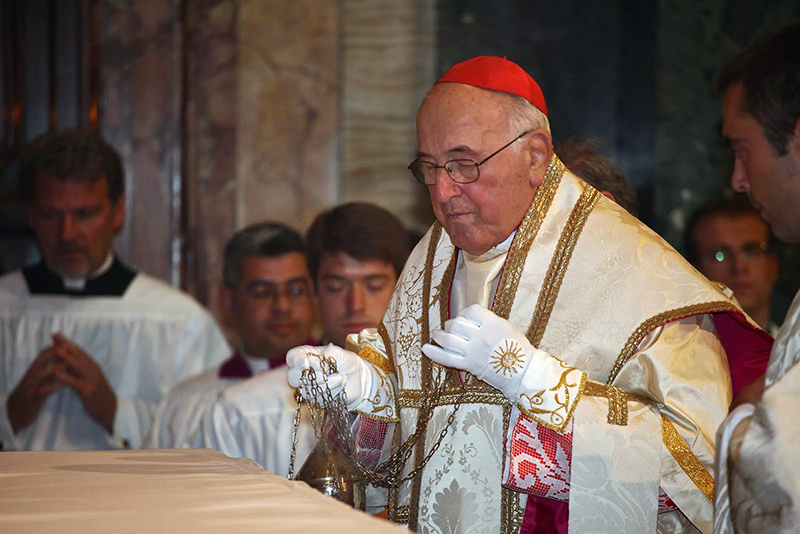
On Saturday, 9 April, Cardinal Walter Brandmüller explicitly commented on the pope’s Apostolic Exhortation on the Family and warns against a dilution of the Catholic Church’s teaching. The cardinal spoke to the German tabloid newspaper, Die Bild, as reported by the German Bishops’ website, katholisch.de.
While many of the statements that are quoted here seem identical with the statement which had been published by Cardinal Brandmüller two days before the publication of the pope’s Exhortation on 8 April, it is significant that he now emphatically repeats some of these statements to a widely distributed newspaper in Germany after the release of the official document in Rome. According to katholisch.de, the cardinal warned against a “watering down” of the Church’s teaching with the help of “a misinterpretation of the document [Amoris Laetitia].” This could, he said, “undermine the credibility of the Church’s proclamation.” Whoever lives “in an invalid second marriage,” says the 87-year-old cardinal, may not, “with the help of a salami tactics,” now come to be admitted to the sacraments, after all.
Cardinal Brandmüller described the attempt to admit exceptions in individual cases as “an impasse” and he continued, saying: “What is fundamentally impossible for reasons of Faith is also impossible in the individual case.”
The German cardinal also reminded us that:
It is the Catholic Church’s teaching (Dogma) that a validly contracted and consummated marriage cannot be dissolved by any power on earth – also not by the Church. Jesus says: ‘What God has bound, man may not separate.’
This interview has been already widely spread in the German-speaking countries. The news website of the Austrian Bishops, kathpress.at also reports on it and entitles its article: “Cardinal Brandmüller Criticizes the Pope’s Principle of the Individual Case [“Einzelfallprinzip”].”
Cardinal Christoph Schönborn, the Archbishop of Vienna, Austria, had made clear on 8 March at the Vatican press conference on the Apostolic Exhortation that the pope indeed desires this application of such a “principle of the individual case” or “case-by-case approach.” The Austrian cardinal touched upon the question as to whether those people who live “in irregular situations” may now have access to the Sacraments. He said that the pope proposes “to discern the situations well” and that this discernment has to consider whether there are “possible ways of answering God and new ways of growth in the midst of limitations.” A small step in the midst of human limitations, said Schönborn with reference to the Exhortation, “can be more pleasing to God” than a “correct life of someone who passes his life without encountering difficulties worth mentioning.” Cardinal Schönborn continued: “In the sense of such a ‘via caritatis‘ (AL 306), the pope then simply says ‘in a footnote’ (351) that ‘in certain cases,’ the help of the Sacraments can be given.”
German prelates are also confirming today that the pope opened up the possibility of access to the Sacraments for those living in “irregular” relationships, such as second “marriages”.
According to Cardinal Walter Kasper, who had given an interview to the German Catholic News Agency KNA on 8 April, the pope did make an “opening” toward the “remarried” divorcees, and Kasper said that “the German bishops can work well with this document.” Concerning the admittance of the “remarried” divorcees to the Sacrament of Holy Communion, Kasper said: “There exists an opening, very clearly.”
The archbishop of Berlin, Germany, Heiner Koch – a participant at the last 2015 Synod on the Family – has just given an interview to the German bishop’s website, katholisch.de, where he made a statement analogous to Kasper’s. The German prelate has stated, with regard to the “remarried” divorcees and their situation, the following:
Francis recommends a differentiated assessment of each individual case. It can be that, with the separation and second marriage, a grave guilt is involved which would exclude the reception of Holy Communion. But, there can also be cases, according to the pope, where there is perhaps not such a grave guilt involved and where he [the pope] thus at least opens up in this document [Amoris Laetitia] the possibility to then come to different consequences [sic – conclusions?]. To put it briefly: It is neither a free ticket [sic] nor a total interdiction which would make the individual case meaningless. It is a piece of a new path which has been opened here.


